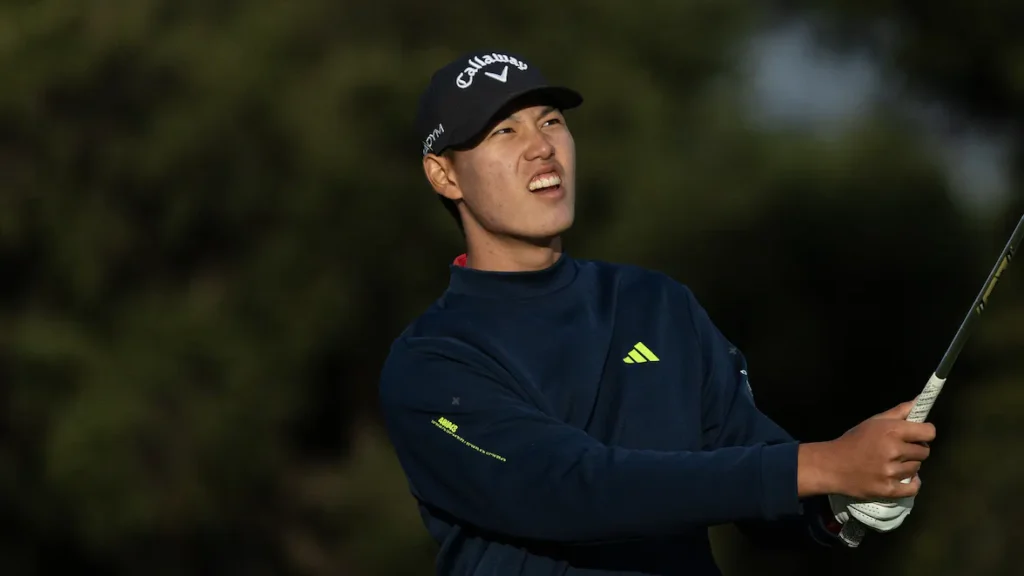Walk around the grounds at Royal Melbourne during the Asia Pacific Amateur Championship and you’ll see more golf bags with US college logos than expected for an event that doesn’t invite American players.
There are two University of California, Berkeley team members proudly carrying Golden Bear golf bags, and another player at Royal Melbourne committed to the college. Same goes for the University of Washington, with two seniors competing at the amateur event run jointly by the R&A and Augusta National, and another committed to the Huskies. There’s an Oklahoma State senior from China, Bo Jin, who finished T-8 in 2019, T-3 in 2021 and runner-up a year ago. There are players who played for Oregon, San Diego State and Michigan. The list goes on.
All up, 37 golfers among the 120-player Asia Pacific field are either playing US college golf or have committed to 31 universities.
Unsurprisingly, a college golfer and a commit are leading the tournament whose winner’s prize is an invitation to the 2024 Masters and the 152nd Open at Royal Troon. Taiwan’s Chuan-Tai “Teddy” Lin, a University of Washington senior, and China’s Wenyi Ding, an Arizona State signee, are tied at three-under par and two clear of a foursome of players at the top.

It begs the question, why college golf? Why has a third of the field, comprised of players from 37 countries in Australasia, chosen the US college route over traditional development pathways the lead to pro golf careers in their homelands? In many countries, particularly the golf hotbeds of Japan and South Korea, the development of amateur golf talent is outstanding. But it’s difficult to compete with the elite coaches, competition, practice facilities, education and exposure found in college golf.
There’s also the ability to play courses like Cypress Point, as Lin points out.
“I got to ‘U Dub’ and the people in Seattle, they are just so passionate about sports,” he says. “They support us so much. We have donors that bring us to courses like Cypress Point, Pasatiempo and Pebble Beach, and other really nice courses before tournaments. Not many people get the chance to have that experience.”
Lin chose Washington largely due to his idol, Taiwan’s C.T. Pan, who played for the Huskies before a PGA Tour career highlighted by a win at the 2019 RBC Heritage and an appearance for the International team later that year at the Presidents Cup at Royal Melbourne.
“If you really want to play professionally [at the highest level], trying to stay in Asia [during college age] and playing Asian tours when you first turn pro and [you are] learning can be very expensive,” Lin says. “If you’re really good and you go to the U.S. for college, you get can get an education, and there are the coaches [who] have been there for a long time. It’s definitely the most competitive environment you can get for amateur golf.”
Sure, players from Asia miss the cuisine from their homelands and they often suffer homesickness.
“The food [in the US] is a different story,” Lin says. “But I love the college atmosphere. Our [football] team is doing great like, fifth in the country. There was a big game recently against Oregon. We went to a sports bar in Georgia after a tournament recently to watch it. It was so much fun.
“You are too busy with golf, and the gym, and school to miss it too much. Many golfers dream of playing on PGA Tour, and if you want to do that you need to get comfortable with a different language and culture.”
Ding, the 2022 US Junior champion and first Chinese winner of a USGA event, agrees. “I’ll get to play the top NCAA events, top courses and top players,” he says. “[College] is also not just to play golf. You have to study and get an education. That’s why more players from Asia are going to college.”
Ding was impressed by ASU’s alumni, including Phil Mickelson and Jon Rahm, but he was blown away by the team’s golf facility. The Thunderbirds Golf Complex, home to the men’s and women’s golf teams, features a state-of-the-art fitness centre and a 22,000-square-foot practice range Mickelson designed for the program that includes a four-acre short-game area.
With any luck, Ding will be joining Masters champions Rahm and Mickelson at Augusta National depending on how the next 36 holes at Royal Melbourne go.
